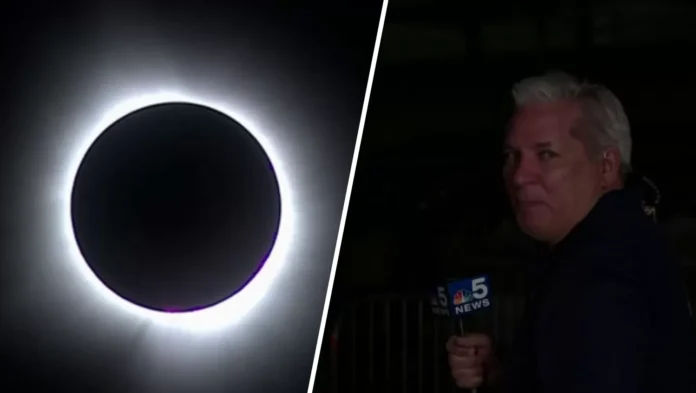Witnessing the 2024 solar eclipse live was a once-in-a-lifetime experience – and NBC 5 Storm Team Meteorologist Pete Sack didn’t waste a moment of it.
Sack, who was reporting live from Indianapolis at the time of totality, became emotional watching the historic moment. The sky turned dark for several minutes in both Indiana and Illinois, bringing cheers, tears, and awe to many who witnessed it.
“It’s totality. This is just amazing,” Sack said through tears. “I can’t believe I’m able to bring this to you.”
And rightfully so. Experts say another total solar eclipse like this won’t be visible for some time.
“The solar eclipses that are going to occur, for the most part, that are going to be visible in our area after this one will not be to the extent that this one is,” Michelle Nichols, director of public observing at the Adler Planetarium, told NBC Chicago.
“This might be the most-watched solar eclipse ever,” Nichols added.
NBC 5 Storm Team Meteorologist Kevin Jeanes called the event “the greatest solar eclipse across the U.S. in our lifetime.”
According to NASA scientists, a total solar eclipse occurs when the new moon intersects the path of the sun in the sky, causing the sun to be partially and then nearly completely blocked from view.
In terms of solar eclipses in the continental U.S., another total eclipse won’t take place for more than 20 years, with a 2044 eclipse occurring in North and South Dakota, among other locations.
According to NASA, the next total solar eclipse that will be visible in Illinois won’t occur until Sept. 14, 2099. That eclipse will be visible in northeastern Illinois, including the city of Chicago, as well as parts of Wisconsin, including Madison, Milwaukee and Kenosha.
For those who missed the total eclipse, the question on everyone’s mind is: how long will it be until Illinois sees another one?
The answer is, unfortunately, quite a long time. The next total solar eclipse that will be visible in Illinois won’t occur until Sept. 14, 2099. That’s over 80 years from now. So if you missed this one, you will have to wait until the next century to witness such a spectacular event.
But why is this particular solar eclipse so special? Well, for starters, it is the first total solar eclipse to cross the entire continental U.S. in 99 years. This means that it was visible to a large portion of the population, making it the most-watched solar eclipse in history.
Additionally, this eclipse was also the longest total solar eclipse in the 21st century, with the total eclipse lasting for over 2 minutes and 40 seconds. This is quite a significant amount of time for a total eclipse, making it a truly once-in-a-lifetime experience.
The next question that may come to mind is, why do we have to wait so long for another total solar eclipse? The answer lies in the alignment of the sun, moon, and Earth. For a total solar eclipse to occur, the moon must be in its new phase and its orbit must intersect with the sun’s path in the sky. This alignment is not a common occurrence and is what makes total solar eclipses so rare.
So what can we expect from the next total solar eclipse in 2099? According to experts, it will be visible in northeastern Illinois, including the city of Chicago, as well as parts of Wisconsin, including Madison, Milwaukee, and Kenosha. This means that if you missed the 2024 eclipse, you may have another chance to witness this incredible phenomenon in your lifetime.
In the meantime, it is important to remember to protect your eyes when viewing a solar eclipse. Looking directly at the sun, even during a partial eclipse, can cause serious damage to your eyes. It is recommended to use special eclipse glasses or a solar filter to safely view the eclipse.
In conclusion, the 2024 solar eclipse was truly a once-in-a-lifetime experience that brought people together to witness a rare and awe-inspiring event. It was a moment that will be remembered for years to come and will go down in history as one of the most-watched solar eclipses ever. So if you were lucky enough to witness it, consider yourself one of the fortunate few. And for those who missed it, don’t worry, you may have another

